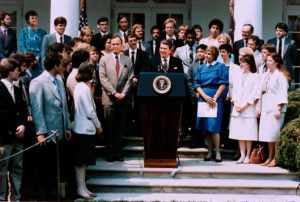
President Reagan meets with Peace Corps trainees departing for Africa during a “National Volunteer Week” ceremony at the White House Rose Garden, 1985.
Originally posted January 14, 2019.
Ronald Reagan understood that the job of reintroducing the study of self-government could not be left to the schools.
“All great change in America begins at the dinner table,” Reagan said in his farewell address. “So, tomorrow night in the kitchen I hope the talking begins. And children, if your parents haven’t been teaching you what it means to be an American, let ’em know and nail ’em on it. That would be a very American thing to do.”
President Reagan was worried that Americans were losing what he called a sense of ‘informed patriotism,’ writes John Fund in NRO.
His farewell address to the nation is best known for his vivid description of just what he’d had in mind all those times when he invoked America as “a shining city on a hill.”
An Informed Patriotism
But for all of his optimism, Reagan did leave his audience with one clear warning for the future. He said the country needed “an informed patriotism.” He greatly feared that we were not doing enough to foster it.
“Are we doing a good-enough job teaching our children what America is and what she represents in the long history of the world?” Reagan bluntly asked.
When he was young, the nation’s youth “were taught, very directly, what it means to be an American,” he noted. “And we absorbed, almost in the air, a love of country and an appreciation of its institutions.” Young people learned those lessons from family, in classrooms, and through popular culture.
Handing Down a Responsible Love of Country
The Gipper worried that we were not handing down to future generations a responsible love of country. “Parents aren’t sure that an unambivalent appreciation of America is the right thing to teach modern children,” he said. “Well-grounded patriotism is no longer in style” for those media figures who direct the course of popular culture.
“We’ve got to teach history based not on what’s in fashion but what’s important,” he urged parents and teachers. “If we forget what we did, we won’t know who we are. I’m warning of an eradication of the American memory that could result, ultimately, in an erosion of the American spirit.”
“Study after study has shown the shocking ignorance of both young people and adults about American ideals, history, and institutions,” continues Mr. Fund.
In 2017, a poll by the Annenberg Public Policy Center showed that only one-quarter of respondents could name all three branches of government. More than one-third couldn’t name any First Amendment rights.
In 2017, the National Association of Scholars released a report entitled “Making Citizens: How American Universities Teach Civics.” As The College Fix reported, Making Citizens suggests that “left-leaning professors have transformed the teaching of traditional civics with an emphasis on activism, creating a pipeline of students eager to serve the goals of secular-progressive causes.” The report’s authors note that instead of teaching “students the foundations of law, liberty, and self-government,” colleges teach them “how to organize protests, occupy buildings, and stage demonstrations.”
Is it too much to expect that public schools today can go back to formally teaching students about representative government, the separation of powers, and landmark Supreme Court cases?
Parents should insist that schools sponsor and encourage debates in which advocates of traditional civics from outside groups can help foster a sense of civic engagement, urges Mr. Fund.
Read more here.
If you’re willing to fight for Main Street America, click here to sign up for the Richardcyoung.com free weekly email.




